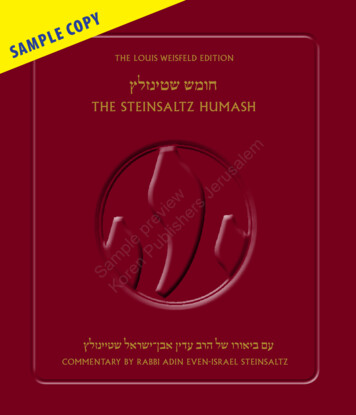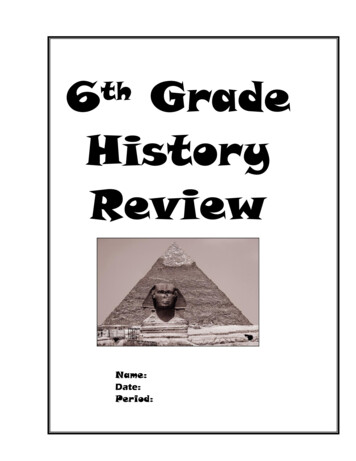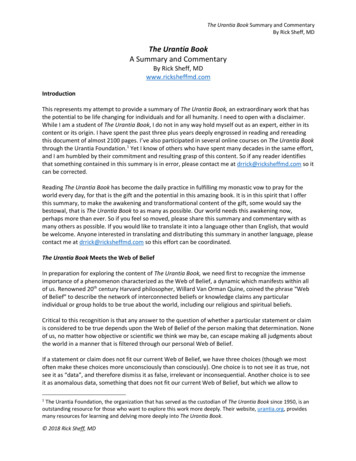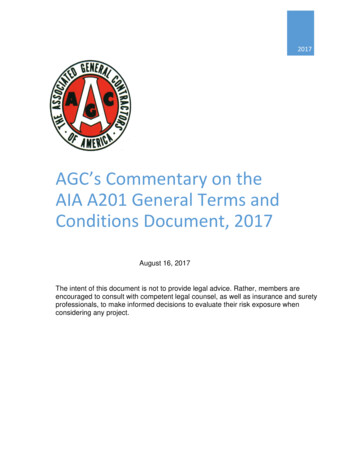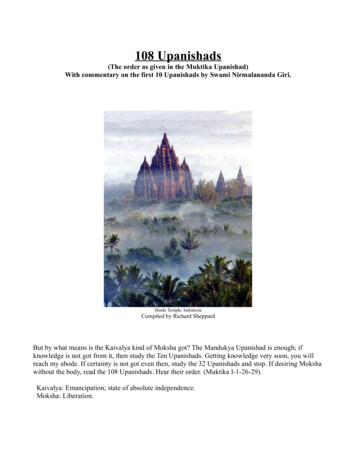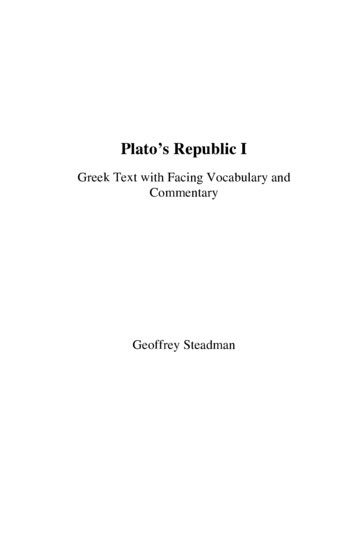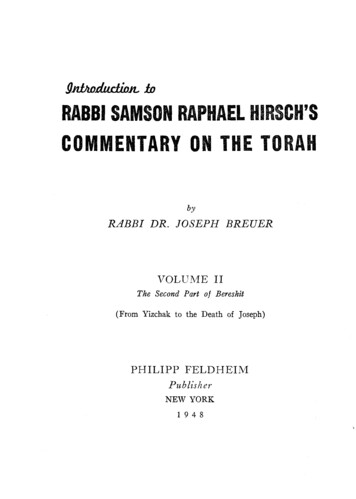
Transcription
9.nflw.dudioJL J:oRABBI SAMSON RAPHAEL HIRSCH'SCOMMENTARY ON THE TORAHbyRABBI DR. JOSEPH BREUERVOLUlVIE IIThe Second Part of Bereshit(From Yizchak to the Death of Joseph)PHILIPP FELDHEIMPublisherNEW YORK19 4 8
Copyright 1948byPHILIPP FELDHEIM45 Essex Street, New York 2, N. Y.Translated from the GermanbyJACOB BREUERPrinted by:TWERSKY BROTHERS1330 Elder Avenue, New York 59, N. Y.
CONTENTS25-2711,1'i1f'l-CHAPTERS7-13Yaakov and Esau. Famine. "Galuth" in the Lifeof the Forefathers. The Blessing of Yizchak. Rivkahand Yaakov. Esau's Hatred. The Mother.N:& ,-CHAPTERS14-262 7-3 2Yaakov leaves his Home. Yaakov's Dream. "TheHouse of G'd". His Vow. At the Well. Laban.Rachel and Leah. The Mothers of the Jewish Tribes.The Wives. Years of Servitude. Promise -andBetrayal. Flight and Separation. The Jewish Worker.The Return.i1'ie' ,-CHAPTERS27-403 2-3 6Yaakov's Message to Esau. Anxiety. The NocturnalStruggle e.Esau.GidSeparation.i1:l::i.') and li:l ji.'). Shechem. Beth-El.Home. -"Israel". Rachel's Death. Reuben. Yizchak's Death.Esau's Historical Development.:eo !-CHAPTERs3 7-4 o41-49Yaakov's Family History. Joseph and his en. The Sale of Joseph. The Father's Grietand Sorrow. Joseph in Mizraim. In the House ofYaakov. Yehuda. Joseph in the House of Potiphar.Temptation. InDream.the Prison.Interpretationofthe
J'i't.:l-CHAPTERS41-4450-59Joseph before Pharao. Interpretation of the Dream.Joseph, Ruler in Mizraim. Joseph's Children. Yearsof Famine. The Brothers come to Mizraim. Joseph'sAttitude. Benjamin. The last Trial.W:1,1-CHAPTERS44-4 759-66Joseph reveals himself. Reconciliation. Yaakov'sHouse enters the "Galuth" of Mizraim. Reunion. InGoshen. Yaakov before Pharao. Joseph takesMeasures in Mizraim. M,1-CHAPTERS47-50Yaakov refuses to be buried in Mizraim. Ephraimand Menashe. Joseph becomes the Head of the Houseof Yaakov. Yaakov's Testament. The Burial. Afterthe Death of the Father. Joseph's Testament.66-77
Chapter 25YAAKOV AND ESAUCh. 25, 19. Yizchak and Rivkab. are to work in closeharmony in the building of the Abrahamitic house. Beforerelating the story of the "descendants of Yizchak", theTorah stresses the dissimilarity in descent of both parents:Yizchak was the worthy son of Abraham, while Rivka'sfather and brother Laban were members of Aramaean tribes.True, Yizchak was a mature man when he married Rivkahwho was still in her early youth - yet was it not questionable whether Yizchak's influence would succeed in bringingup his children in the Abrahamitic spirit? Is there not aprinciple of our Sages, based on experience, that mostchildren tend to develop traits characteristic for the brothersof their mothers? Thus the Torah prepares us for what isto follow.Yet for some time Rivkah, like Sarah, did not bearchildren. Each stone in the building of the "House of Israel"was a gift presented as a symbol of Divine power. Fortwenty years Yizchak struggled in prayer before G'd "becauseof his wife" ( 21) - for, even though G'd had given assurances to his father that he would have "descendants byYizchak" ( 21, 12), this did not necessarily mean that hewould have these children by Rivkah.Yizchak's prayer was answered and Rivkah becamemother. The yet unborn children struggled violently in herwomb. Whenever this happened (p t:l ) Rivkah said toherself: "Why this to me?", i. e. why does this have tohappen to me? She could think of no explanation. And,the sages comment, she went to the Yeshiva of Shem and7
Chapter 25Eber hoping to obtain an answer to her questions ( 2 2).Hers is a great revelation: the two children in her wombrepresent two nations (i:l 1 ) which, at the very outset,are destined to separate into two independent statehoods(i:l t.:l '7), different if not opposite in character, ideals andaims. These two children symbolize the eternal conflictbetween the Divine Law and brutal force. It is a strugglewhich has stirred every generation and shaped the course ofhistory. For long centuries the outcome of this struggle willremain uncertain. Eventually, however, the apparently morepowerful opponent will submit and pay homage to hismaterially weaker foe ( 23).The parents were not unprepared for the diverse traitsand character of their children. The more surprising (i1Ji11)that they were twins, after all looking very much alike,although the older one was physically more developed.They called him 1tt'Y (derived from i1t!'l)), "a complete,finished man". The second child followed, grasping firmlythe heel of his brother - which, in view of the previousrevelation, impressed Yizchak sufficiently ip 1 to call hisson :lpy ( 24-2 6)."As the boys were growing up" (27) it became moreand more apparent how completely different they were incharacter and way cf life. From a remark of our Sages welearn that this evergrowing conflict was partly due to afaulty education. "Bring up the lad according to his way"( Mish. 2 2, 6) is the important Jewish principle of education:it is true that the aims of Jewish education are the same forall children who are to be trained towards their G'd-willedJewish vocation of life. The methods, however, which haveto be employed to attain this goal, must necessarily varyin accordance with the natural talents, inclinations andgeneral disposition of the child. What is appropriate forand to the benefit of one child, may be extremely harmful toanother. Yaakov and Esau just do not fit on one schoolbench. If Esau's parents had come early to the sad8
Chapter 25-262).nbet,IdSndict5leofrillJreilisits11) e, d.te,lyusliS{,,orveryconclusion that their son was not at all inclined towards"boring spiritual" activities, they might have succeeded indeveloping his good traits to such an extent that he couldstill have been called a worthy grandson of Abraham. Thesituation became worse through the fact that Yizchak lovedEsau while Rivkah preferred Yaakov, which certainly didnot diminish the problems of education. And it was all soeasy to understand: Yizchak was quiet by nature, unworldly,and was probably greatly attracted to Esau's lively mannerand unabashed joy of living. Rivkah, on the other hand,through the experiences of her own youth had long beenfamiliar with the "Esau-type" and it was quite naturalthat she preferred Yaakov's quiet, spiritually-minded wayof life. The lesson: Parents must offer their children equalinterest, equal love. Always the skilled hunter, Esau knewhow to trap his father "with his mouth".At this point the Torah reports ( 29-34) an event whichis characteristic for both youths: Esau returns from thehunt. He is very hungry. Yaakov is busy preparing a mealfor himself. Esau demands it greedily. The "red" med oflentils stimulates his appetite, he wants to swallow it ( Ul'Y'?),he can think of nothing else but satisfy his stomach. Thisthen is to be the "11:J , his will be the "spiritual" leadershipof the Abrahamitic house! "Sell me your birthright!" carelessly, full of disgust Esau throws it at his brother ( 34) :When an Esau is hungry, his "birthright" means less to himthan a dish of lentil soup. He will never even beginto understand Yaakov's "hunger". This was not a "business"deal - at no time did Yaakov derive any material advantagefrom it. - This incident clearly demonstrates the extentof the irreparable break, the wide gap between the brothers.!d:: rtoolLdFAMINECh. 26. As in the days of Abraham ( 12, 10) the promised9
Chapter 26land, supposedly "flowing of milk and honey", was ravishedby famine. This was to give expression to the great truthin the life of our forefathers: Eretz Yisroel owes its success full progress to Gd's nation, "it vomits forth its inhabitants"once it ceases to be the nation of G'd and becomes againdesert and wasteland. This admonition accompanied ourpeople upon its entry into the land when it beheld the twomountains, the desolate Ebal and the fruitful Gerisim: uponEbal the altar of the Torah was erected - it alone is ableto transform Ebal into Gerisim. Land and nation belongtogether, to each other, none can flourish without the other.Yizchak's intention to seek refuge in Mizraim is vetoedby the Divine Will. He is to remain in this land and faithfully guard the sacred heritage left to him by Abraham.G'd renews all the blessings that He once bestowed uponAbraham: these lands shall belong to his children, the nationof G'd - blessed by G'd they are to become a blessing toall the nations on the earth ( 3-5)."GALUTH" IN THE LIFE OF THE FOREFATHERS(V. 6-11, see Ch. 12, 10 on; also Ch. 20). "In th;s land''and "in this year", despite famine and privation, divine bles·sing favored the work of his hands; he did not greedily pileup the rich and plentiful produce but brought it to the market,thus providing "100 markets" ( 12). Soon, however, mistrustand jealousy were aroused"the man (in the language ofthe Philistines) became too great for them" ( 13). The Galuthbegan with Yizchak. It is true that Abraham was also astranger in the land,he enjoyed the respect and admiration of the people as the "Prince of G'd". Yizchak, onthe other hand, was rebuffed by the jealousy, even undisguised hatred of the population: "Leave us" ( 16). Yaakov'sposition appears to be one of complete servitude; - we havehere the three stages of the Galuth as represented in the lives10
Chapter 26of our forefathers in which they had to prove themselves,and the Divine Covenant underwent its (most crucial) test.These are also the Galuth stages which our nation has toendure, except for a reverse order (s. 3. B. M. 26, 42).As slaves our people upheld the PV li i . pn li i andfinally Cili li i are yet to stand their test:"emancipated", in the midst of the nations of the world,we are to realize and put into practice the pn li i .To win the respect of the nations by abandoning the DivineCovenant has always resulted in complete disaster. Only ourfaithful adherence to the Divine Covenant may justify thehope that the nations of the world will learn to look uponus as the true descendants of Abraham deserving of theirunreserved recognition and respect.18-2 2. Even after the initial rebuttal Yizchak had tosuffer from constant interference. The wells dug by hisservants become the object of violent arguments - fighting(i't!'V) and attempts to hinder his activities (il.l tv) atevery step: "ours is the water" (20); you dug the well,the hole belongs to you, but the water is ours! And now astrange occurrence: at the time when his servants had dug thethird well which remained uncontested and Yizchak, for thefirst time, saw a possibility of staying and living freelyand undisturbed ( 22) - he broke camp voluntarily andreturned to the place of his birth and childhood whereAbraham had lived in fulfilment of his great task ( 21, 33).This self-imposed isolation resulted in the ensuing appearanceof G'd who assures him of His blessing and protection:by reminding him of Abraham, "his servant", G'd indicateswhat he expects of Yizchak. At once Yizchak erects thereGd's altar and, following his father's example, proclaims inthe name of G'd.Rebuffed, Yizchak voluntarily shunned the Philistines.Now their king is eager to meet him to secure the avowedfriendship of "the man whom G'd has blessed" (26-29). Itis a climax in the life of Yizchak.u
Chapte1· 26-2734-3 5. Significantly the ensuing events in the house ofYizchak are introduced by the following two sentences:Esau marries two Hittite women who offer defiant opposition(iii ) to the ideals of Yizchak and Rivkah and the spiritof the Abrahamitic house. Here Esau demonstrated hisflagrant inability to perpetuate the Abrahamitic life-ideals.What a magnificent "hunter with the mouth" Esau musthave been as he succeeded in deceiving his father so effectively that Yizchak was all but ready to bestow upon himthe Abrahamitic blessing!THE BLESSING OF YIZCHAKRivkah and Yaako1)Ch. 27. As was emphasized repeatedly, the Torah makesno attempt to hide the weaknesses and mistakes of the greatleaders of our people, men or women. They are not in needof defense. This story of Rivkah and Y aakov is the storyof a deception and must therefore be accounted for as a"wicked deed". Honesty and straightness (i1i1 ), in firmopposition to any crooked deal, are to be the proud attributes of the Je·wish people. G'd does not overlook theslightest transgression in the lives of His righteous ones,as expounded in the comment of the Midrash to thisincident: "Father Yaakov caused Esau to cry out bitterlyEsau is revenged when Yaakov's descendants, in Susa,cried out just as bitterly over the descendants of Esau" "Esau cried three tears: one rolled down from his righteye, another from his left one, and one tear he held back.It is this tear that has salted the bread of our exile withbitter tears".What was the motive for Rivkah's action? It is inconceivable that she would plan to obtain by falsehood andtreachery the fatherly blessing for her beloved son. Moreover, the return of Esau would inevitably result in stamping12
Chapter 27her action as a miserable betrayal. Yet this was Rivkah'svery intention. For a long time she had known of Esau'scomplete unworthiness. Until now she had failed in herattempts to open Yizchak's eyes. Realizing that her husbandwas ready to bestow upon Esau the Abrahamitic blessing,she felt that the time had come to demonstrate to Yizchakby a drastic action how easy it was to deceive him. The inevitable discovery of the deception was actually part of acareful plan. The success was complete. As Yizchak realizedthat he had been deceived, his heart was struck with suddenterror; - he saw, as the Sages put it, the Gehinnom wideopen before him, saw how he had been deceived all his lifeand he proclaimed solemnly: "He shall also be blessed" ( 33).Yizchak asks Esau to go on the hunt and to preparefood for his table - "that my soul may bless you" ( 4).This was the great moment when his son was to receive theAbrahamitic blessing. The Abrahamitic convocation of lifeculminates in the dedication of all talents and activitiestowards the perpetuation of the ethical and good in life.Even Esau's enjoyment of the hunt could and should servea good purpose: "for once take the weapons of your dailyoccupation and hunt an animal for me and prepare, yourself,a tasty dish for me - ". For once Esau's occupation is tobe devoted to charity and love because it is the way Yizchakdesperately wants him to be, that his soul may be happyover him and the blessing bestowed.Rivkah deems it neccessary to act. As his mother shedemands blind obedience from Yaakov ( 8), for she knowsthat his honesty and sincerity would not tolerate her action.Her only alternative is to make him obey. Whatever Yaakovis about to do is done solely in obedience to his mother.This explains the ever-recurring in the Verses 11-14.The Abrahamitic blessing implies for the recipientmaterial plenty from Gd's hand to be used in accordancewith the Divine Will, dedicated to the service of G'd: H. who receives the blessing is to become a source of blessing13
Chapter 27for his fellow-men (28-29). Esau owes his material wealth"to the heaven and the earth". His sword is the secret ofhis power and the master of his fate. Esau conquers theworld - but all his conquests "only benefit his brother''.For the future does not belong to brutal force: it belongsto the G'd-willed aims, perpetuated by Israel. Only Esau'srecognition of this fact and his subsequent voluntary subordination under his brother (1 1 related to 11 to descend,humiliate oneself) can make him an equal "partner", forthen Yaakov's demands will cease to be a "yoke upon hisshoulder" ( 39-40).ESAU'S HATRED.THE MOTHEREsau offers his brother unending hatred "because ofthe blessing the father bestowed upon him" ( 41). It isdoubtful whether this refers to the blessing the father gaveYaakov or the one Esau himself received and in whichYizchak predicted Esau's inevitable subordination to hisbrother.Esau plots bloody revenge. Rivkah is told of the plan;;;of "her eldest son Esau". She calls immediately "her youngerson Yaakov" ( 42). At the conclusion the following apparently superfluous words are added: "Rivkah was themother of Yaakov and Esau" (28, 5). All this may referto the unchanged position of Esau as the elder brotherdespite the previous events, and also to Rivkah whostill considered herself Esau's mother. It motivates hermoving plaint: If Esau becomes a murderer "why shallI lose both of you on one day?" (45). Yaakov is toleave the house at once until his brother's anger willhave subsided ( 44). Yet he must never forget that he is"his brother". This trait clearly reveals the noble-mindednessof Rivkah: one could have expected her to report Esau's14
Chapter 27-28plotting to Yizchak in order to justify her own action. Yetshe merely explains to her husband that for obvious reasonsshe intends to send Yaakov away ( 46).YAAKOV LEAVES HIS HOMEOnce again Yizchak blesses Yaakov, this time in thefull knowledge of his son's responsibility towards the Abrahamitic way of life and the future of his people ( 28, 3-4).In the house of Bethuel he will find the fitting wife to helphim build his Jewish house: it is the family which, in spiteof Laban, produced a Rivkah - "your mother" ( 2), astwice repeated in this verse]In spite of the blessing Yaakov leaves his father'shouse a home that combines material and spiritualwealth - a poor and destitute refugee. Esau was to understand fully that his mother's action was not inspired byeconomic considerations. This chapter concludes on a significant note ( 6-9): When Esau discovered that his fatherhad blessed Yaakov and then sent him to Padan Aramthat he may find a wife there and not among the daughtersof Canaan, the realization dawned upon him that "thedaughters of Canaan were bad in the eyes of his father" (8).He had never tried to understand the mental anguish (26,35) that his marriages had brought to his parents. Insteadof separating from his Canaanite wives he adds "the daughterof Yishmael to his wives" (9). This very step demonstratedEsau's total lack of ability required for the guidance of the"Abrahamitic house".YAAKOV'S DREAM."THE HOUSE OF G'D".HIS VOWYaakov leaves his home to found his Jewish house. All15
Chapter 28subsequent incidents and events center around this foundingof a family from which the tribes of a people are to growwhich will proudly bear Yaakov's name. His great heritage:The Jewish home must be the house of G'd where He is tobe sought and found. This is not only the G'd of natureor the G'd of history: it is G'd in the house which menerect for Him and His Divine Will.Wandering along, Yaakov "meets the place" (l:l1p0 not l:l1pt:l:::1) which commands his attention. The sun harldisappeared beyond the horizon and he decides to staythere overnight. He protects his head by building a lowwall of stones around it ( 11) - the first home that hebuilds for himself. He falls asleep and dreams. A ladderis shown to him, placed "upon the earth" by a supremepower: "its top reached unto heaven" - it is to rise fromthe earth to the heaven, signifying the close harmonybetween heaven and earth and the rise of earthly lifetowards heavenly heights from where it receives its destiny.(Thus the Midrash sees in this ladder "the indine towardsthe altar", the Sinai, whose breadth extends over the wholeearth).Each new liJJii ( 12-13) introduces a new series ofthoughts and ideas. Yaakov sees angels, Divine messengers,executors of the Divine Will on earth. He watches themascend from the earth to receive Divine directions. He seesthem descend 1:::1, against him: according to the Sages theysaw in heaven the ideal picture of man as he should be and now they find him on earth, asleep. They want to meethim in a hostile approach illii1 (a third group oithoughts), "and behold, G'd stands at his side"; it is notc p'i , G'd of the creation who masters all forces and alsoHis angels, it is 'il who is close to His men whom Heeducated towards the G'd-willed goal."I am G'd, the G'd of your father Abraham and theG'd of Yizchak" ( 13). The grandfather is called "father"and the actual father stands aside like a stranger: The16
Chapter 28Torah does not emphasize Yaakov's physical ancestry. Itis the implication that counts: Abraham is to be yourfather - Yizchak is but the link in the chain - you areto become the son and heir to the Abrahamitic convocationof life. Yaakov's house and the Jewish nation are to tacklethe task, assisted and reassured by the Divine promise tosecure this land for him and for his descendants. From theshining example of Yaakov with his house and his descendants (1ViT::l, 1::l) as a nation, demonstrating G'd in thedomestic life and in the life of an entire nation - blessingis to emanate "for all families of the earth" ( 14). As afinal promise G'd assures the first Galus-Jew of His assistance and protection and the certainty of his eventualreturn; G'd will never leave him, His help is ever-presentas long as Yaakov and his descendants are able to live upto the Divine expectations ( 15).The immediate impression of the dream-vision is formulated by Yaakov in these words (16-17): Here then is G'd,not in heaven - wherever a man without guilt finds restand peace - there is G'd! Gd's glory is not to be foundin heaven - its place is in the lives of men. That mortalmen should be the bearers of Gd's glory on earth - weunderstand only too well how this idea with its impliedtasks and demands must have filled Yaakov with apprehension: for must not the house of man become a houseof G'd "wherein G'd dwells", a house that is to become the"gateway to heaven", - demonstrating the intimate relationship between heaven and earth?Yaakov dedicates the place and the stone that servedas his first home during this memorable night as a monumentwhich he calls "the house of G'd", symbolizing the futurerole of a place which heretofore lacked significance andderived its name from a hazelnut tree ( 18-19) - and hepronounces a solemn vow ( 20-21). He prays for Gd'sDivine protection "on the road upon which he is about toembark". As he begins to erect his own house he embarks17
Chapter 28-29upon the road of i10J'"'lEl whichaccording to theSageshas caused many a struggling man to renounceG'd, lose his morality and become thief and murderer,Yaakov prays that G'd may help him to preserve hismoral integrity, to attain a modest position in life, andto let him return peacefully to his parental home. WitpG'd at his side as 'it ( o t:llilit Iii f.)) he promises todedicate all that Divine love bestows upon him to G'd andthe perpetuation of His VFill: that is the meaning of thegiving of "maasser". G'd is also to be w,p7K, the LawGiver whose demands must be faithfully met. Thus thisstone is to be the founding stone for his coming "house ofG'd". Here the great truth is eloquently expressed: Jewishhouses are to rise as houses of G'd. The so-called "housesof G'd" deserve their sacred character as !Y1pt:l only as longas the sanctification of all spheres of Jewish life emanate;rfrom them.AT THE WELLRACHELCh. 29. This night with its CA.l)eriences brought abouta profound change in Yaakov. While earlier it says "Yaakovwent" ( 28, 10), it is now: "Yaakov lifted up his feet andwent": his legs do not carry him -- it is his spirit, arousedby G'd, that guides him towards the goal of his journey.Arriving in Charon he comes upon a well in the midst ofa field, surrounded by three flocks of sheep. The mouthof the well was covered bv a heavy stone which only thepooled strength of all shepherds managed to remove. Theydid not trust one another in the land of the Arameans,these shepherds were fearful lest one of them draw morewater and more frequently than the others. Yaakov inquiresabout Laban. Driven by his sense of righteousness headmonishes the strange shepherds to refrain from letting18
Chapter 29the "possessions" (i1.:ip not ) '::!:) rest aimlessly in broaddaylight. In the course of their conversation the shepherdsinform him that the girl approaching the well with herflock was Rachel, the daughter of Laban. When he sawthe daughter of Laban, "the brother of his mother", andthe sheep of "the brother of his mother", he went to thilwell and 7 , (not 77 1) pushed (with ease) the stone offthe mouth of the well. Then he watered the sheep of "thebrother of his mother", (10).- Three times it is emphasizedthat Laban was the brother of his mother. At this momentYaakov is guided solely by the thought of his mother.What he did was not a gallant gesture towards a prettygirl. The thought of his mother, the intensity of his devotionto her, combined in creating in his soul an emotional impactthat led him to a spontaneous and wholly unforeseen action:He kissed Rachel. That his action was motivated by hisclose relationship with his mother is borne out by the factthat the kiss was accompanied by tears. At the same timehe realized that Rachel must have thought him out of hismind as he embraced and kissed her under tears. At oncehe withdraws from his cousin and explains his unusualbehaviour. ( 12). - This scene paints a vivid picture ofYaakov's inborn sense of righteousness and responsibilityfor his fellow-men. It also illustrates his healthy physicalcondition, the sheer strength of his muscles, qualities whichhis descendants were to inherit from him and which aside from spiritual values - were the lone possessionsthat he took along on his journey.LABAN.RACHEL AND LEAHLaban expected to meet in Yaakov the rich heir of hissister's wealthy family. He is disappointed when his nephewrelates "all these happenings" ( 13) and explains the reasons19
Chapter 29for his sudden arrival without money or resources. Thusthe stunned and somewhat embarrassed 1 in Laban'sreply: Although poor, you are welcome here as a relativeof the family ( 14).From the very beginning of his stay it becomes evidentthat Yaakov is a skilled and valuable worker (15). ForLaban, in an attempt to secure Yaakov's services, offersto reward him in addition to full board in his house. Yaakovloves the beauteous Rachel. As tothe Verse accordsher the flattering words: she had soft and tender eyes.Yaakov is ready to work seven years for Rachel. At theend of these years of servitude Rachel had already becomehis wife. Thus Jl'W ll n.:n (21)these seven yearsconstituted the pt:t ip.Laban breaks his promise,attempting to justifyhis betrayal by pointing to the local custom of taking itfor granted that a man who asks for the hand of a youngerdaughter is also thinking of the older one; for the customdid not permit the younger daughter to marry before herolder sister. Leah must be married before "we" can giveRachel to you. This "we" embodies Laban's feeble attemptat justification of a flagrant betrayal. Needless to add: Youmust serve me for another seven years! (26-27).THE MOTHER OF THE JEWISH TRIBES"He also loved Rachel" ( 30) indicates that Yaakovalso bved Leah and never let her feel his disappointmentover her father's betrayal. She was undoubtedly the lessloved one - yet it was she whom G'd chose to becomethe ancestress of our people. As bride and wife she foughtfor the love of her husbandbut only as mother didshe fully succeed. With calm confidence in Gd's protectivecloseness she receives her children in whose names she20
Chapter 29-30immortalized the longing and happiness of the Jewishmarriage. Leah, the sad one, experienced the pleasant andpeaceful aspects of married life, while Rachel, the "lucky"vvife, was confronted with more serious prospects. Thehappiness of Leah's marriage grew steadily with each child.··G'd has looked upon my affliction" (32); - until nowRachel's preferred position was clearly evident ( i1Hi).The situation changed somewhat with Reuben's birth, butit was obvious that Leah had still not succeeded in gainingher husband's undivided love (yt.:HU). Thus she calls hersecond son Shimon ( 33). It was the birth of her third sonwhich restored in her the feeling of complete equality asshe expresses the hope that henceforth the longed for,intimate companionship with Yaakov would become reality.It is not she but Yaakov who names this third son, vividlyillustrating their newly won close relationship ( 34). Afterth birth of the fourth child, she no longer required manifestations of Yaakov's increased love - she devotes herselfwholeheartedly and filled with gratitude towards G'd to thehappy duties of a mother ( 3 5) .Ch. 30. Rachel remained childless. She ascribes her fateto the apathy of Yaakov who appeared to be happy withLeah's children and failed to plead with G'd on Rachel'sbehalf, since she knew quite well that Yaakov's motherhad become mother only as a result of Yizchak's ferventplea. ( 1). In her passionate longing for children, her onlypossible contribution to the erection of the Yaakov-house,she takes drastic action (as once Sarah before her, Ch. 16) :she gives him her maid as a wife. She realizes that G'd hasdealt harshly with her by denying her children; yet shefeels richly rewarded at the birth of "her" first childwhose spiritual mother she is ( 6). The arrival of the secondchild strengthens her conviction that it is a "Divine contest"between her and her sister, fought for a Divine and sacredgoal: the building of the future nation of G'd ( 8).21
Chapter 30Rabbi Breuer Galley 5Driven by the same desire, Leah follows the exampleset by her sister: she also feels richly rewarded by the childher maid bore for her ( 13). She expresses this feeling clearlyat the birth of the next son ( 13): "my happiness increases","the women will praise my continuing happiness" (i,W is the step, iWK means: to advance, "step ahead" in joyand happiness) .THE WIVES.Leah's whole life, in its serious moments and also inits intimate relationship to Rachel, is dominated by thegreat idea of her contribution to the future of her people.This is clearly demonstrated by the ensuing story (14-18).
( Mish. 2 2, 6) is the important Jewish principle of education: it is true that the aims of Jewish education are the same for all children who are to be trained towards their G'd-willed Jewish vocation of life. The methods, however, which have
